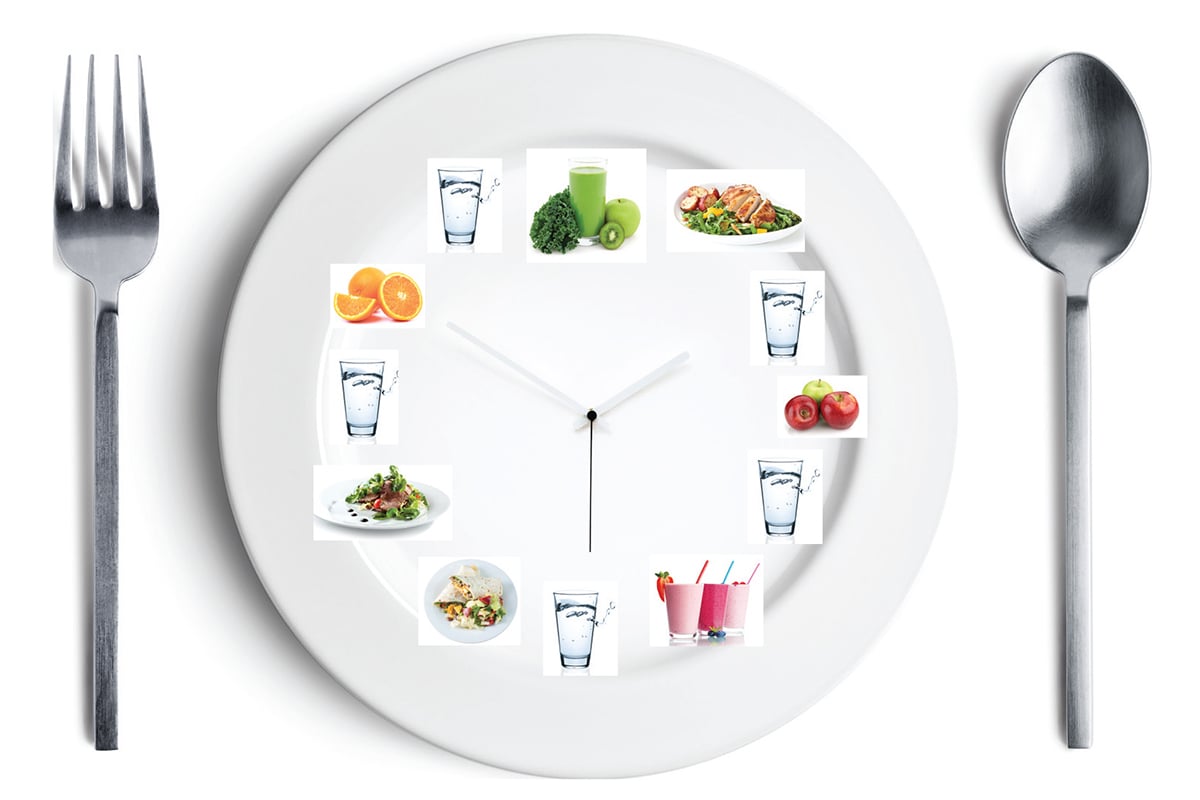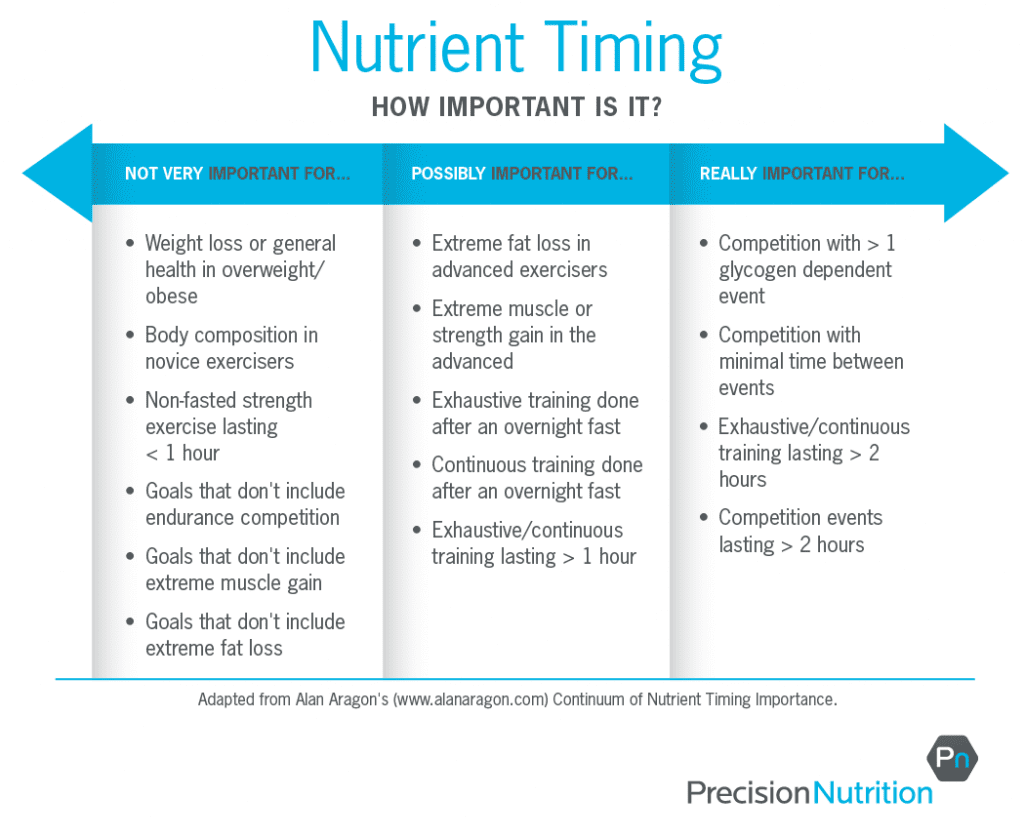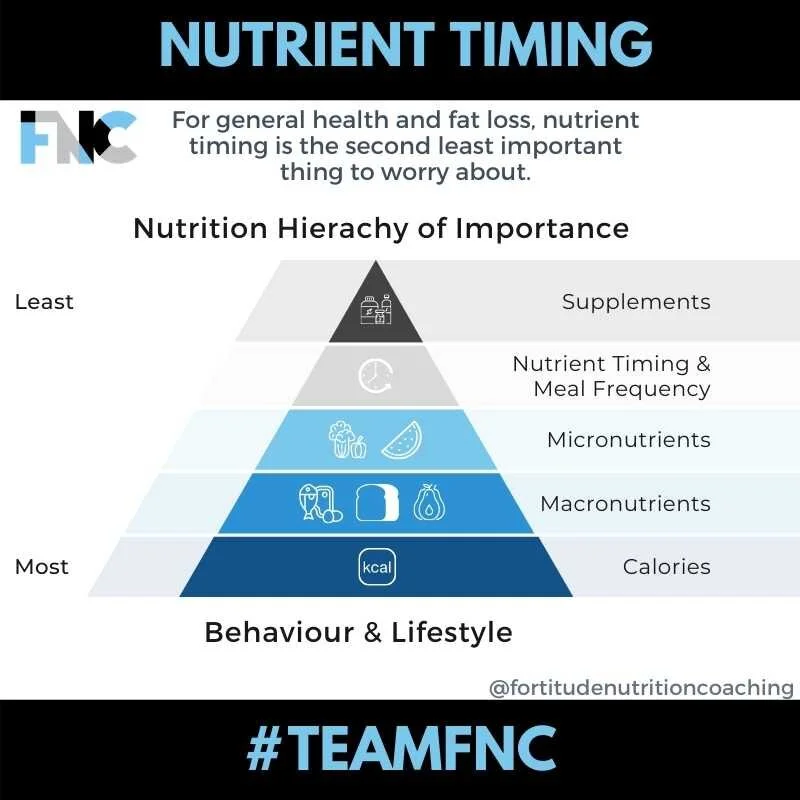Contents
- I. Introduction to Nutrient Timing for Recovery
- II. Importance of Proper Nutrient Timing
- III. Key Nutrients for Optimal Recovery
- IV. Timing and Quantity of Protein Intake
- V. Carbohydrate Timing and Refueling Strategies
- VI. The Role of Fats in Recovery
- VII. Hydration and Electrolyte Balance for Optimal Recovery
- VIII. Supplements for Enhancing Recovery
- IX. Meal Frequency and Timing for Recovery
I. Introduction to Nutrient Timing for Recovery

When it comes to optimizing recovery after a workout, nutrient timing plays a crucial role. Properly fueling your body with the right nutrients at the right time can enhance muscle repair, glycogen replenishment, and overall recovery.
While exercise is important for building strength and endurance, it also places stress on our muscles and depletes energy stores. Therefore, providing adequate nutrition after a workout is essential to support the body’s recovery process.
The Importance of Post-Workout Nutrition
After a strenuous workout session, your muscles are primed to absorb nutrients like a sponge. This post-workout “anabolic window” lasts approximately 30 minutes to two hours after exercise when your body is most receptive to nutrient uptake.
Consuming protein-rich foods or supplements during this timeframe can stimulate muscle protein synthesis (MPS), which promotes muscle growth and repair. Additionally, carbohydrates consumed post-workout help replenish glycogen stores that were depleted during exercise.
The Role of Protein in Recovery
Protein serves as the building block for repairing damaged muscle tissues caused by intense physical activity. It provides essential amino acids that are necessary for muscle protein synthesis and aids in reducing exercise-induced muscle damage.
To optimize recovery, aim for around 20-30 grams of high-quality protein within an hour post-workout. Sources such as lean meats, eggs, dairy products, legumes, or plant-based proteins like tofu or tempeh are excellent choices.
The Significance of Carbohydrates in Recovery
In addition to protein consumption post-exercise, replenishing glycogen stores through carbohydrates is vital for optimal recovery. Carbohydrates provide energy during workouts and play a crucial role in muscle glycogen synthesis.
Include complex carbohydrates like whole grains, fruits, and vegetables to replenish glycogen stores effectively. Aim for a carbohydrate intake of 0.5-0.7 grams per pound of body weight within the post-workout period.
Hydration for Enhanced Recovery
Fluids are often overlooked but are equally important for recovery. Sweating during exercise leads to fluid loss, and adequate hydration is essential to maintain proper bodily functions.
Ensure you drink enough water before, during, and after your workout to prevent dehydration. If you engage in intense or prolonged exercise, consider consuming electrolyte-rich beverages or adding electrolyte supplements to replenish lost minerals.
II. Importance of Proper Nutrient Timing

When it comes to optimizing recovery and maximizing the benefits of your workouts, proper nutrient timing plays a crucial role. By strategically consuming specific nutrients at certain times, you can enhance muscle repair, replenish energy stores, and promote overall recovery.
The Anabolic Window
One key concept in nutrient timing is the idea of the anabolic window. This refers to a period immediately following exercise when your body is primed for nutrient absorption and utilization. During this time, your muscles are more receptive to nutrients, making it an ideal opportunity to supply them with the necessary fuel for repair and growth.
Pre-Workout Nutrition
A well-planned pre-workout meal or snack can provide your body with the energy it needs to perform optimally during exercise. Including carbohydrates in this meal helps replenish glycogen stores in your muscles, while protein provides amino acids that support muscle protein synthesis.
Intra-Workout Fueling
In some cases, particularly during longer or intense workouts, consuming carbohydrates and electrolytes during exercise can help sustain energy levels and delay fatigue. Sports drinks or gels containing easily digestible sugars are commonly used for intra-workout fueling.
Post-Workout Nutrition
The post-workout period is where proper nutrient timing becomes especially important for recovery. Consuming a combination of carbohydrates and protein within 30 minutes to an hour after exercise helps kickstart muscle repair processes by supplying necessary nutrients directly when they are needed most.
Nighttime Recovery
Your body also goes through essential repairs while you sleep. Consuming a slow-digesting protein before bed ensures a steady supply of amino acids throughout the night, promoting muscle recovery and growth. Casein protein, found in dairy products, is often recommended for its slow-release properties.
Hydration
While not directly related to nutrient timing, proper hydration is crucial for overall recovery and performance. Staying adequately hydrated throughout the day and during your workouts aids nutrient absorption, regulates body temperature, and supports various physiological functions.
Individual Variation
It’s important to note that individual needs may vary when it comes to nutrient timing. Factors such as training intensity, duration, goals, and personal preferences should be considered when determining the best approach for you.
III. Key Nutrients for Optimal Recovery

When it comes to maximizing recovery after intense physical activity, certain key nutrients play a crucial role in replenishing energy stores, repairing damaged tissues, and reducing inflammation. Here are some essential nutrients that can aid in your post-workout recovery:
1. Protein
Protein is the building block of muscles and is vital for muscle repair and growth. Consuming an adequate amount of protein after exercise helps promote muscle protein synthesis and speeds up recovery. Aim to include high-quality sources of protein such as lean meats, poultry, fish, eggs, dairy products, legumes, and plant-based proteins like tofu or tempeh.
2. Carbohydrates
Carbohydrates are the primary fuel source for your body during exercise. Replenishing depleted glycogen stores post-workout is crucial to restore energy levels and support optimal recovery. Include complex carbohydrates like whole grains (oatmeal, brown rice), fruits (bananas, berries), and starchy vegetables (sweet potatoes) in your meals or snacks after workouts.
3. Omega-3 Fatty Acids
Omega-3 fatty acids have powerful anti-inflammatory properties that can help reduce exercise-induced inflammation and promote faster recovery. Including foods rich in omega-3s such as fatty fish (salmon, trout), walnuts, chia seeds or flaxseeds can be beneficial for aiding in muscle repair.
4. Antioxidants
Athletes frequently experience oxidative stress due to strenuous exercise which can lead to cell damage and impair recovery processes. Antioxidant-rich foods like berries (blueberries, strawberries), dark leafy greens (spinach kale), nuts (almonds), and colorful vegetables (tomatoes, bell peppers) can help combat oxidative stress and support faster recovery.
5. Vitamin D
Vitamin D plays an essential role in bone health and muscle function. Engaging in outdoor activities and getting sunlight exposure is a great way to boost your vitamin D levels naturally. Additionally, incorporating vitamin D-rich foods like fatty fish (mackerel, sardines), fortified dairy products, or taking supplements can be beneficial for recovery.
IV. Timing and Quantity of Protein Intake

When it comes to optimizing recovery, the timing and quantity of protein intake play a crucial role. Protein is essential for repairing damaged muscle tissue and promoting muscle growth after intense workouts or physical activity.
The Importance of Post-Workout Protein
Consuming protein immediately after your workout is vital for maximizing recovery. During exercise, your muscles undergo stress and experience micro-tears, which need to be repaired to enhance strength and endurance. By providing your body with an adequate amount of protein post-workout, you can stimulate muscle protein synthesis, leading to faster recovery.
The Window of Opportunity
The window of opportunity for optimal post-workout protein intake is within 30 minutes to one hour after finishing your exercise session. This timeframe is when your muscles are most receptive to nutrient uptake, allowing them to efficiently utilize the amino acids from the consumed protein for repair and growth.
Adequate Protein Quantity
The quantity of protein you consume also plays a significant role in facilitating optimal recovery. The recommended daily intake for individuals engaging in regular physical activity is around 0.8 grams per kilogram of body weight per day. However, if you’re looking to enhance recovery or build muscle mass, increasing this amount may be beneficial.
Protein Distribution Throughout the Day
In addition to post-workout consumption, distributing your daily protein intake evenly throughout the day can further support recovery efforts. Aim for three main meals that include high-quality sources of lean proteins such as chicken breast, fish, tofu or legumes.
Pre-Sleep Protein Intake
Incorporating a small serving of slow-digesting proteins before bed can also contribute positively towards overnight recovery. This strategy helps provide a steady supply of amino acids to your muscles throughout the night, reducing muscle breakdown and supporting repair.
Considerations for Vegetarians and Vegans
If you follow a vegetarian or vegan diet, it’s essential to ensure you’re consuming a variety of plant-based protein sources to meet your daily requirements. Combining different sources such as legumes, nuts, seeds, and whole grains can help optimize protein intake.
V. Carbohydrate Timing and Refueling Strategies
When it comes to optimizing recovery, the timing of carbohydrate consumption plays a crucial role. In order to replenish glycogen stores efficiently and support muscle repair, it is important to strategically plan when and how much carbohydrates you consume after physical activity.
1. Post-Workout Carbohydrate Intake
The immediate post-workout period is considered a critical time for carbohydrate intake. Consuming carbohydrates within 30 minutes to an hour after exercise can help maximize glycogen synthesis and promote faster recovery.
To optimize your post-workout carbohydrate intake, aim for a combination of simple and complex carbohydrates. Simple carbohydrates like fruits or sports drinks provide quick energy, while complex carbohydrates such as whole grains or sweet potatoes offer sustained energy release.
2. Glycemic Index Considerations
The glycemic index (GI) measures how quickly a particular food raises blood sugar levels. Foods with a high GI are rapidly digested and absorbed, leading to quick spikes in blood sugar levels. On the other hand, foods with a low GI are digested more slowly, resulting in slower release of glucose into the bloodstream.
In terms of refueling strategies, consuming high-GI foods immediately after intense exercise can help replenish glycogen stores rapidly. However, including low-GI foods in your overall recovery meal plan can provide sustained energy release over an extended period of time.
3. Carb-Protein Combination
Incorporating protein along with your post-workout carbohydrates has been shown to enhance muscle protein synthesis and aid in muscle recovery process more effectively than consuming carbs alone
.
An ideal ratio for carb-protein combination is generally around 4:1 or 3:1, with four grams of carbohydrates per one gram of protein. This combination helps increase insulin secretion, which is important for glycogen synthesis and muscle repair.
4. Carbohydrate Timing for Endurance Athletes
For athletes involved in endurance activities lasting longer than 90 minutes, consuming carbohydrates during exercise can help maintain blood glucose levels and delay fatigue.
To effectively refuel during prolonged exercise sessions, aim to consume around 30-60 grams of carbohydrates per hour. Sports drinks or energy gels are convenient options that provide easily digestible carbohydrates without causing gastrointestinal distress.
5. Pre-Exercise Carbohydrate Loading
In certain cases, pre-exercise carbohydrate loading can be beneficial for athletes engaged in prolonged high-intensity activities or endurance events lasting more than two hours.
The goal of carbohydrate loading is to maximize glycogen stores prior to the event by consuming a higher percentage (70-80%) of calories from carbohydrates in the days leading up to the activity. This strategy ensures that you start your workout or competition with fully stocked glycogen reserves.
By following these carbohydrate timing and refueling strategies, you can optimize your recovery process after physical activity and support your overall performance goals.
VI. The Role of Fats in Recovery
In the realm of sports nutrition, carbohydrates and protein tend to steal the spotlight when it comes to post-workout recovery. However, the role of fats should not be overlooked. Fats play a crucial part in supporting optimal recovery and overall health.
1. Energy Source
Fats serve as a concentrated source of energy during exercise and can also provide fuel for recovery. While carbohydrates are the primary energy source for high-intensity activities, fats become increasingly important during prolonged endurance exercises or lower intensity workouts.
2. Nutrient Absorption
Fat consumption enhances nutrient absorption, especially fat-soluble vitamins (A, D, E, K) and phytochemicals found in fruits and vegetables. Including healthy fats with your post-workout meal can help ensure that you absorb all the essential nutrients required for effective recovery.
3. Anti-Inflammatory Benefits
Certain types of fats possess anti-inflammatory properties that aid in reducing exercise-induced inflammation within the body. Omega-3 fatty acids found in foods such as salmon, walnuts, and chia seeds have been shown to reduce muscle soreness and promote faster recovery after intense workouts.
4. Hormone Production
Fats are essential for hormone production and regulation within the body. Hormones like testosterone play a critical role in muscle repair and growth following exercise-induced damage. Including healthy dietary fats like avocados or olive oil can help support optimal hormone function necessary for efficient recovery.
5. Joint Health
Certain types of dietary fats contribute to joint health by providing lubrication between bones while also reducing inflammation around joints caused by intense physical activity or repetitive stress on specific areas.
It is important to note that the quality of fats consumed is crucial. Opt for sources of healthy fats such as avocados, nuts, seeds, olive oil, and fatty fish. Avoid or limit intake of unhealthy trans fats and saturated fats found in processed foods.
VII. Hydration and Electrolyte Balance for Optimal Recovery
Proper hydration and electrolyte balance are crucial for optimal recovery after physical activity. When you engage in exercise, especially intense or prolonged workouts, your body loses fluids through sweat. Replenishing these lost fluids is essential to prevent dehydration and promote efficient recovery.
Importance of Hydration
Hydration plays a vital role in maintaining bodily functions, including regulating body temperature, lubricating joints, delivering nutrients to cells, and removing waste products. During exercise, the body’s water needs increase significantly due to elevated sweating rates. Failing to replenish lost fluids can lead to dehydration which negatively impacts performance and prolongs recovery time.
Signs of Dehydration
It’s important to recognize the signs of dehydration so that you can address it promptly. Common symptoms include excessive thirst, dry mouth or throat, dark-colored urine (indicating concentrated urine), fatigue or dizziness, headache, muscle cramps, and decreased urine output.
Strategies for Optimal Hydration
To ensure proper hydration during recovery:
- Drink plenty of water: Aim to consume at least 8-10 cups (64-80 ounces) of water per day.
- Create a hydration plan: Develop a schedule for fluid intake throughout the day and during workouts.
- Maintain electrolyte balance: Include foods rich in electrolytes such as potassium (bananas), sodium (salted nuts), magnesium (leafy greens), and calcium (dairy products).
- Avoid excessive caffeine/alcohol consumption: These substances can dehydrate the body; limit their intake.
Electrolyte Balance
Electrolytes are minerals that carry an electric charge and play a crucial role in various bodily functions. They help maintain proper fluid balance, regulate muscle contractions, support nerve function, and aid nutrient absorption. During intense exercise or prolonged physical activity, electrolyte levels can become imbalanced due to sweating.
Importance of Replenishing Electrolytes
Failure to replenish electrolytes can lead to muscle cramps, fatigue, impaired performance, and even more severe complications such as hyponatremia (low sodium levels) or hypernatremia (high sodium levels). Therefore, it’s essential to restore electrolyte balance post-workout for optimal recovery.
Ways to Restore Electrolyte Balance
To restore electrolyte balance after exercise:
- Consume foods rich in electrolytes: Include sources like bananas (potassium), oranges (calcium), avocados (magnesium), and salty snacks (sodium).
- Sports drinks or supplements: Consider consuming sports drinks or supplements designed specifically for replenishing electrolytes.
- Add a pinch of salt: Sprinkle a small amount of salt on your post-workout meals to enhance sodium intake.
VIII. Supplements for Enhancing Recovery
When it comes to optimizing recovery after intense physical activity, certain supplements can play a crucial role in replenishing nutrients and promoting muscle repair. While a well-balanced diet should be the foundation of any recovery plan, these supplements can provide an extra boost to help your body bounce back faster.
1. BCAAs (Branched-Chain Amino Acids)
BCAAs are essential amino acids that cannot be produced by the body and must be obtained through diet or supplementation. They consist of leucine, isoleucine, and valine, which are known for their ability to stimulate protein synthesis and reduce muscle damage. Taking BCAAs before or after exercise can enhance muscle recovery and reduce post-workout soreness.
2. Creatine
Creatine is a naturally occurring compound found in small amounts in meat and fish but can also be taken as a supplement. It has been extensively studied for its ability to improve performance during high-intensity activities by increasing energy production in muscles. Additionally, creatine supplementation has shown to enhance post-exercise recovery by reducing muscle damage markers.
3. Omega-3 Fatty Acids
Omega-3 fatty acids are essential fats that have been associated with numerous health benefits, including reduced inflammation and improved cardiovascular health. When it comes to exercise recovery, omega-3s have shown promise in reducing post-exercise muscle soreness and accelerating the healing process.
4. Vitamin C
Vitamin C is a powerful antioxidant that plays a vital role in collagen synthesis – an important component of connective tissues such as tendons and ligaments that can get stressed during intense workouts or training sessions. By consuming adequate amounts of vitamin C, you can support tissue repair and reduce the risk of injury.
5. Magnesium
Magnesium is involved in over 300 biochemical reactions in the body, including protein synthesis and muscle function. It also plays a critical role in regulating energy metabolism and reducing exercise-induced oxidative stress. Supplementing with magnesium can help optimize recovery by supporting muscle relaxation and reducing muscle cramps or spasms.
Remember, while supplements can be beneficial for enhancing recovery, they should not replace a well-rounded diet. Always consult with a healthcare professional or registered dietitian before starting any new supplementation regimen to ensure it aligns with your specific needs and goals.
IX. Meal Frequency and Timing for Recovery
When it comes to optimizing recovery from intense workouts, meal frequency and timing play a crucial role. By strategically planning your meals, you can replenish energy stores, repair damaged muscle tissue, and enhance overall recovery.
The Importance of Post-Workout Nutrition
Immediately after a workout, your body is in a prime state to absorb nutrients efficiently. This post-workout window is commonly referred to as the “anabolic window.” To maximize the benefits of this window, it’s essential to consume a well-balanced meal or snack within 30 minutes after exercise.
Your post-workout nutrition should consist of carbohydrates and protein in an optimal ratio. Carbohydrates help replenish glycogen stores, while protein aids in muscle repair and growth. Aim for around 20-30 grams of high-quality protein combined with 40-60 grams of carbohydrates.
Maintaining Stable Blood Sugar Levels
In addition to post-workout nutrition, it’s important to maintain stable blood sugar levels throughout the day for optimal recovery. Consuming regular meals every 3-4 hours helps provide a steady supply of nutrients to support muscle repair and growth.
Avoiding long periods without food prevents your body from entering a catabolic state where it breaks down muscle tissue for energy. Instead, focus on consuming balanced meals that include lean proteins, complex carbohydrates, healthy fats, and plenty of fruits and vegetables.
The Role of Pre-Workout Nutrition
While post-workout nutrition takes precedence when it comes to recovery optimization, pre-workout nutrition also plays a vital role in fueling your workouts effectively. It’s important to consume a balanced meal or snack containing both carbohydrates and protein about 1-2 hours before your workout.
Carbohydrates provide the necessary energy to power through intense exercise, while protein helps prevent muscle breakdown during your workout. Including a small amount of healthy fats can also help sustain energy levels throughout your training session.
The Influence of Hydration
Proper hydration is often underestimated but has a significant impact on recovery. Dehydration can impair performance, delay recovery, and increase the risk of injury. It’s crucial to drink enough water throughout the day and especially before, during, and after workouts.
A general guideline is to aim for at least 8 cups (64 ounces) of water daily, adjusting based on activity level and environmental conditions. Additionally, consider consuming electrolyte-rich fluids or sports drinks if engaging in prolonged or high-intensity exercise sessions.
Incorporating these meal frequency and timing strategies into your recovery routine can significantly enhance your body’s ability to repair and rebuild after intense workouts. Remember to tailor these recommendations based on individual needs and consult with a healthcare professional or registered dietitian for personalized guidance.<

Shelby Cortez is a dynamic and passionate individual with a strong background in the fitness industry. With a Bachelor’s degree in Exercise Science from the prestigious University of California, she has gained extensive knowledge about the human body and its mechanics. Shelby’s dedication to fitness goes beyond her education, as she has spent years honing her skills as a personal trainer and group fitness instructor. Her expertise in workout routines and nutrition has helped countless individuals achieve their fitness goals. Shelby’s commitment to health and wellness is evident in her own lifestyle, as she consistently pushes herself to new limits in the gym. Whether it’s weightlifting, yoga, or HIIT workouts, Shelby Cortez is the go-to expert for all things fitness-related.
